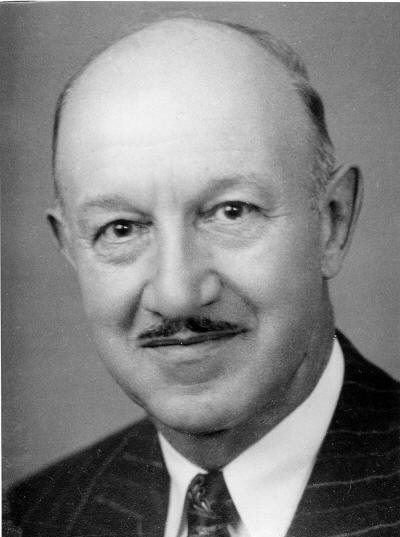|
|
Bill Hargiss after the War, 1946
Note by Genevieve Hargiss:
The war was over when
Bill went to Hawaii. He knew that the assignment was only for a short term, but
he wanted it very much. He believed athletics to be particularly important to armed
services personnel who were in the unsettled state of waiting to be discharged.
He had written a letter to the athletic board at KU, asking that his leave of absence
be extended until the war department dismissed him. There was no answer, so he went
to Hawaii anyway. While he was there he received a curt cablegram from the chancellor
saying that his position would be filled by someone else unless he returned immediately.
Bill's temper was usually under control, but when it did flare it was horrendous.
This was one of the times. In a surge of what he considered to be justifiable anger
at the tone of the cablegram, he fired an answer right back, telling the chancellor
what he could do with the position--in as explicit terms as could be sent by cable.
However, he knew that it was not actually the chancellor who had engineered the
denial of his request but another administrator who saw this as an opportunity to
be rid of someone who had never danced like a puppet to his tune.
Bill had been through some bad experiences at KU and did
not really want to go back. In later years he insisted that he had no regrets about
blowing-up his job there. Nevertheless, when he came home in the spring of 1946,
he found that it was not easy to get work, although he looked in many directions.
Younger men were being discharged from military service and taking almost all of
the available jobs. Also, women had entered the work force in droves during the
war, and many of them did not want to leave it now. Bill had an offer to teach at
the University of Zurich in Switzerland, but he would not be able to take his family
with him, at least not right away. He did not choose to take a chance on how long
he would have to be away from them. They settled in Topeka, and the money they had
saved from Bill's service pay did not last long.
In Topeka, Bill worked for a few months in a government
office. He did not tell his children much about this, but we suspect that his duties
were little more than answering the telephone and relaying messages between the
State government and Washington. At home, Vera helped with living expenses by taking
every private piano pupil she could get.
Sometime during the first half of 1947, Bill went to work
as a traveling salesman for the Enterprise Wholesale Company in Kansas City, a distributor
of household appliances. His territory was northwestern Missouri and northeastern
Kansas, where he called on dealers regularly to demonstrate appliances to their
customers and take orders. (His best seller was a spin-dry washing machine.) He
could still keep his home in Topeka and be there most weekends. Vera told us that
when Fridays came around he would head for home, even though he sometimes had to
drive great distances to get there. She did not demand this; the compulsion was
Bill's. Most of his dealers were in small towns, and the hotel accommodations were
undoubtedly bleak. The main reason, however, that he hated this job was that he
did not like to be away from his home and away from Vera as much as it required.
Yet, it was a living, and he stuck with it for several years.
In 1951 he was invited to join the Town and Country Real Estate
Company as a salesman. This allowed him to be at home more, but he did not do as
well financially as he had expected. He was worried, but it was not his nature to
be despondent. On the plus side, he made many lasting and loyal friends during this
period. Bill's and Vera's daughter Shirley lived with them in
Topeka during the school year of 1951-1952 and commuted to KU for graduate courses.
In retrospect, she writes as follows:
"Dad was selling real estate during the winter of 1951-1952.
Because of that, I was asked to sing at the state real estate convention. I made
a parody on Rosemary Clooney's song "Come On A My House." It went "Come On A Buy-A
House." I remember how easy it was to sing with Dad smiling in the audience."